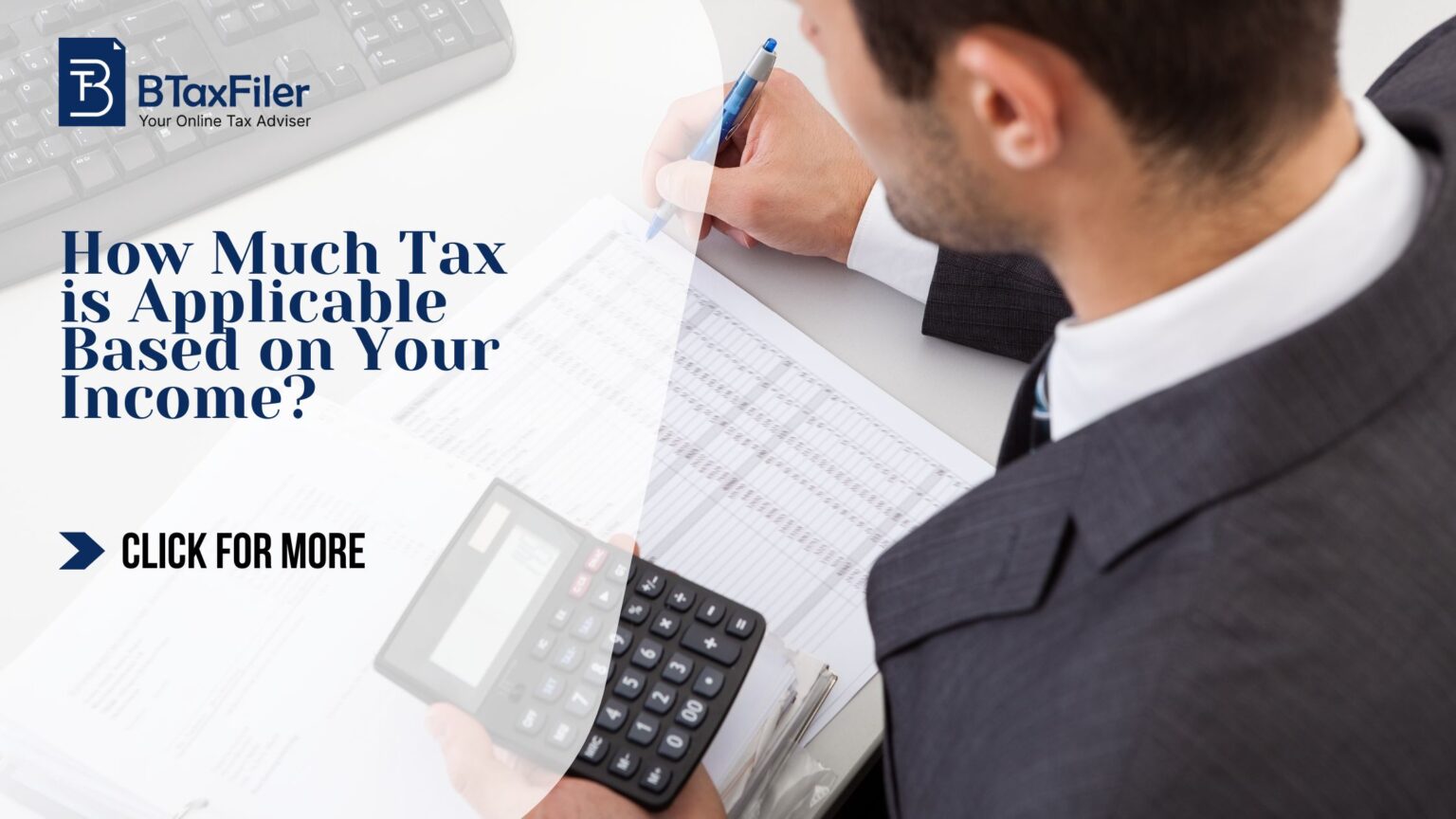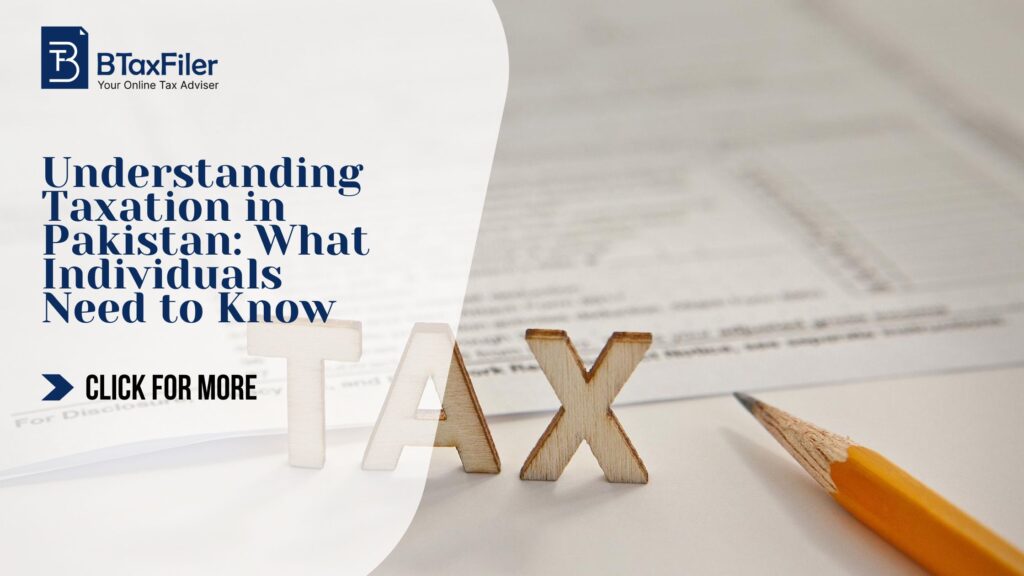At Btaxfiler, we specialize in offering expert tax consultation services in Pakistan, helping individuals and businesses navigate the often complex landscape of tax regulations. One of the most frequently asked questions we encounter is, “How much tax is applicable based on your income?” In this detailed guide, we will walk you through the structure of income tax in Pakistan, helping you better understand the tax slabs, rates, and additional factors that influence how much tax you are required to pay.
Understanding the Tax System in Pakistan
In Pakistan, income tax is imposed on various sources of income, including salary, business profits, property income, and capital gains. The Federal Board of Revenue (FBR) is responsible for overseeing tax collection. The income tax system is progressive, meaning that higher earners pay a greater percentage of their income in taxes. Tax rates and slabs are updated annually in the Federal Budget, making it crucial to stay informed of the latest changes.
What is Taxable Income?
Before delving into the tax slabs, it’s essential to understand taxable income. Taxable income refers to the total amount of income that is subject to tax after deducting allowances, exemptions, and tax credits. It includes:
- Salaries
- Business profits
- Income from property
- Capital gains
- Dividends and interest
- Other sources, such as royalties or foreign income
Once all eligible deductions are applied, the resulting figure is your taxable income, which determines your tax liability.
Income Tax Rates for Salaried Individuals
The tax rates for salaried individuals differ from those applicable to businesses and other categories. The FBR releases updated tax slabs each fiscal year, with different rates based on income brackets.
For the fiscal year 2023-2024, the income tax slabs for salaried individuals are as follows:
| Annual Income (PKR) | Tax Rate |
|---|---|
| Up to 600,000 | 0% |
| 600,001 – 1,200,000 | 2.5% |
| 1,200,001 – 2,400,000 | 12.5% |
| 2,400,001 – 3,600,000 | 17.5% |
| 3,600,001 – 6,000,000 | 22.5% |
| 6,000,001 – 12,000,000 | 32.5% |
| Over 12,000,000 | 35% |
Example Calculation for Salaried Individuals
Let’s assume an individual earns an annual salary of PKR 2,000,000. According to the tax slabs, the first PKR 600,000 is exempt from tax. The next PKR 600,000 will be taxed at 2.5%, and the remaining PKR 800,000 will be taxed at 12.5%.
Here’s a breakdown of the calculation:
- 2.5% on PKR 600,000 = PKR 15,000
- 12.5% on PKR 800,000 = PKR 100,000
The total tax payable is PKR 115,000.
Income Tax Rates for Business Individuals
For individuals who run businesses or are self-employed, the tax slabs are slightly different from those applicable to salaried individuals. The income tax rates for business income for the fiscal year 2023-2024 are as follows:
| Annual Income (PKR) | Tax Rate |
|---|---|
| Up to 400,000 | 0% |
| 400,001 – 800,000 | 5% |
| 800,001 – 1,200,000 | 10% |
| 1,200,001 – 2,400,000 | 15% |
| 2,400,001 – 3,600,000 | 20% |
| Over 3,600,000 | 30% |
Example Calculation for Business Owners
If a business owner earns PKR 3,000,000 annually, the tax calculation would be as follows:
- 5% on PKR 400,000 = PKR 20,000
- 10% on PKR 400,000 = PKR 40,000
- 15% on PKR 1,200,000 = PKR 180,000
- 20% on PKR 600,000 = PKR 120,000
Thus, the total tax payable will be PKR 360,000.
Other Forms of Taxable Income
Property Income
Property income, such as rental income, is also subject to tax. The tax rates for rental income vary based on the annual amount received:
- Up to PKR 200,000 – 0%
- PKR 200,001 – PKR 600,000 – 5%
- PKR 600,001 – PKR 1,000,000 – 10%
- Over PKR 1,000,000 – 15%
Capital Gains Tax
If you’ve made investments in securities or real estate, any profit made on the sale of these assets will be subject to capital gains tax (CGT). The rates for CGT depend on the holding period of the asset and the type of asset.
For real estate, the following rates apply:
- For properties held for less than 1 year: 10% CGT
- For properties held between 1-2 years: 5%
- For properties held for more than 2 years: 0%
For securities such as stocks, the CGT rate is 15% if the shares are held for less than a year.
Tax Credits and Deductions
Btaxfiler also assists clients in understanding the available tax credits and deductions, which can significantly reduce your tax liability. Some common tax credits include:
- Donations to charitable organizations
- Contributions to approved pension funds
- Investments in government schemes
- Educational expenses
These deductions can be applied to your taxable income, reducing the overall tax payable.
Penalties for Non-Compliance
It is essential to comply with the FBR’s tax filing regulations to avoid penalties. Failing to file taxes on time or under-reporting your income can result in hefty fines and legal action. The FBR is actively working to enforce tax compliance and has various systems in place to track down defaulters.
How Btaxfiler Can Help You
Navigating Pakistan’s complex tax system can be overwhelming, but with Btaxfiler, you don’t have to do it alone. Our expert tax consultants offer personalized services to ensure that you not only file your taxes correctly but also take advantage of all applicable tax credits and deductions. Whether you’re a salaried individual, a business owner, or an investor, our team has the knowledge and experience to guide you through every step of the process.







